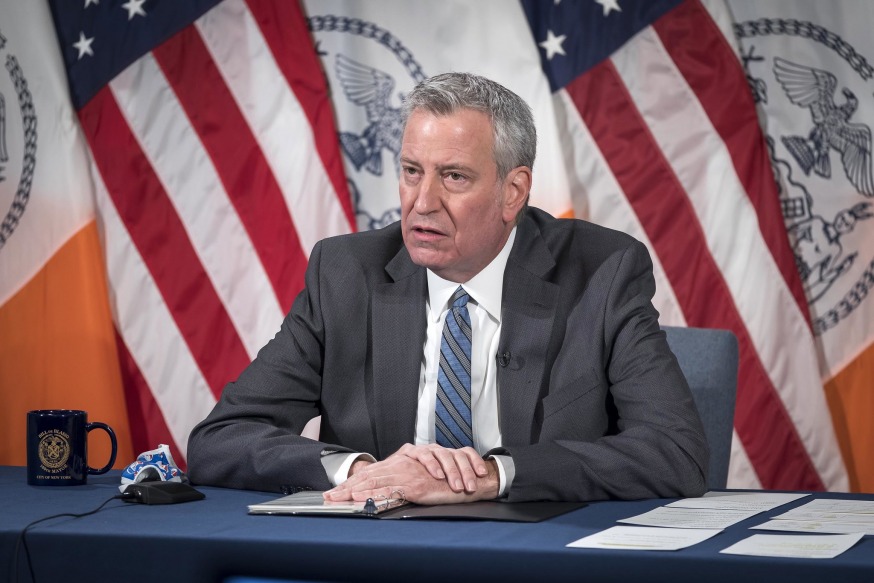
Mayor Bill de Blasio ( Ed Reed/Mayoral Photography Office)
Jan. 7, 2021 By Allie Griffin
Mayor Bill de Blasio is demanding that the state allow the city to begin vaccinating more New Yorkers — such as seniors and frontline workers — for COVID-19 immediately.
The city currently has the authority to vaccinate people who fall under Phase 1A of the state’s vaccine distribution plan. People in this category are mainly health care workers and congregate care center residents and staff.
De Blasio wants the state to grant the city the authority to vaccinate New Yorkers 75-years and older and other frontline workers, like NYPD officers. These groups are included in Phase 1B, the next part of the state distribution plan.
“Right now we need to vaccinate all New Yorkers who are vulnerable, all New Yorkers who are high priority — everyone who is willing,” de Blasio said during a morning press conference. “We need the freedom to vaccinate.”
People 75 and older are the most vulnerable to coronavirus and are at greater risk of serious illness and death, the mayor said.
“We should be able to vaccinate them right now,” he said.
He also wants to be able to vaccinate first responders and essential workers such as grocery store workers, educators and childcare providers as soon as possible.
“We’ve depended on them in this crisis, they’ve been heroes…,” he said. “They all need to be vaccinated now.”
The city cannot legally vaccinate seniors and essential workers until the state grants it permission.
Governor Andrew Cuomo has said he wants all health care workers and others in Phase 1A of the distribution plan to be vaccinated before moving onto vaccinations in Phase 1B. His reasoning is that the state’s supply of the COVID-19 vaccine is limited.
However, de Blasio and city health officials said they have more vaccine doses available than willing arms to poke.
Dr. Mitch Katz, the president and CEO of the city’s public hospital system, NYC Health + Hospitals, said he has thousands of appointments available for COVID-19 vaccinations with few health care workers booking them.
“Everybody at Health + Hospitals who wants to get vaccinated has that opportunity,” Katz said. “But I still have thousands of slots available. I want to put that vaccine in the arms of people who need it.”
The city wants to use the thousands of available appointments to vaccinate more New Yorkers for the coronavirus, but cannot without Cuomo’s approval.
“Sometimes the federal government, the State government need to stand back and let local government do what it knows how to do best,” de Blasio said. “This is one of those times.”
He said expanding the number of eligible New Yorkers for the vaccine would help speed up the vaccination process.
Meanwhile, the city is continuously adding more facilities where currently eligible New Yorkers can receive the coronavirus vaccine.
Health officials are eyeing the Queens Theatre in Flushing Meadows Corona Park as a likely vaccination site that will be open 24/7, de Blasio said.
Four schools in the borough will also be converted to vaccine sites, as early as Sunday. These facilities will be open seven days a week from 9 a.m. to 7 p.m.
Those eligible to receive the vaccine in Phase 1A of the state’s plan must make an appointment at one of the facilities. The city has set up a webpage where people can find their nearest vaccine site and make appointments.
State officials have also created a tool to check one’s eligibility for the vaccine.
De Blasio said he is launching a hotline Monday to assist seniors in making an appointment. He hopes the state expands eligibility for the vaccine by then.
“I’m just hoping and praying the state government will hear our call, give us that freedom so we can move forward,” he said.
One Comment

The legal and medical definition of a senior citizen is that they are sixty-five plus years old. If seniors are to be vaccinated as part of plan 1-B this should include those between 65 and 74 years of age at easily accessible locations within all the boroughs. It is unrealistic to think seniors can stand in lines and commute distances to get vaccinated. A matter of logistics for accessibility to vaccine locations for seniors (65 and older) needs to be seriously considered and to include all not just people 75 years and older, especially those who have disabilities.